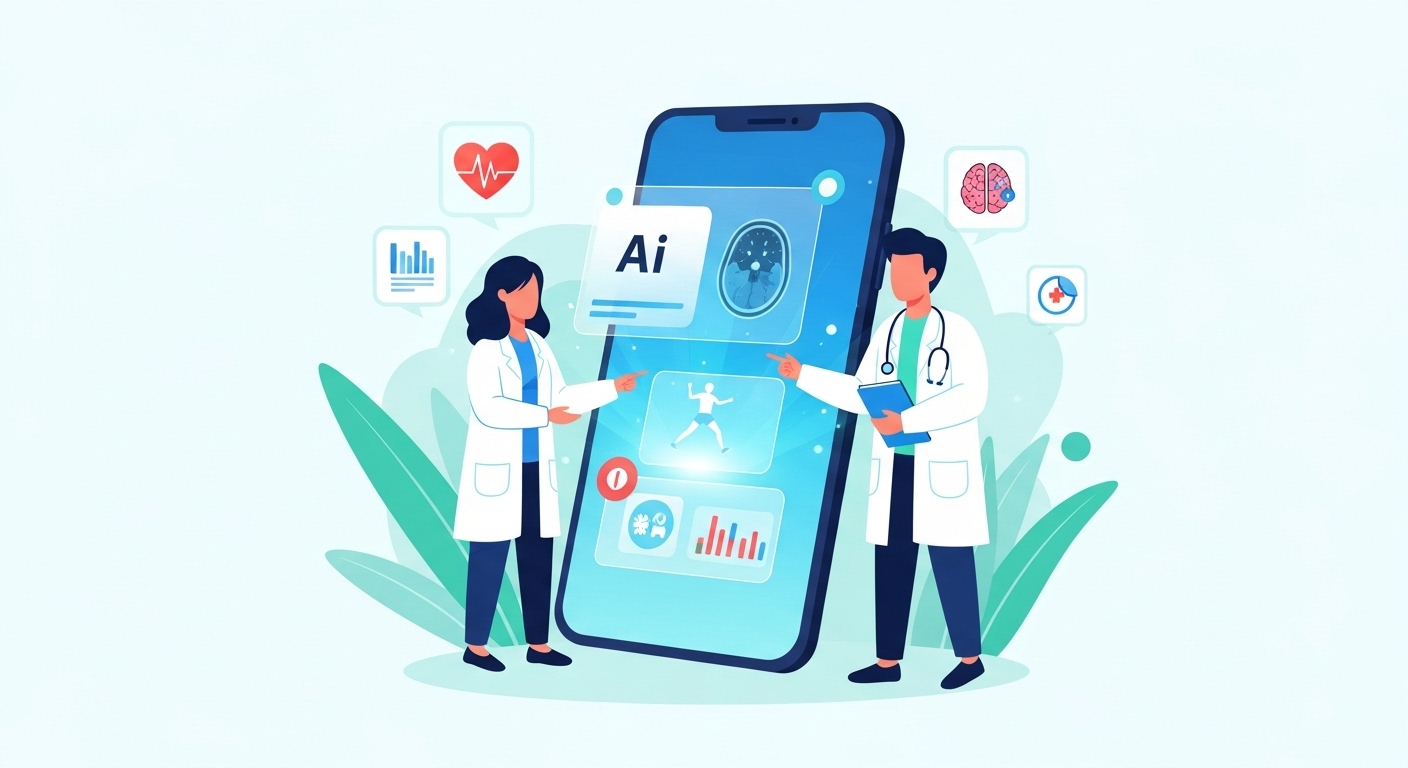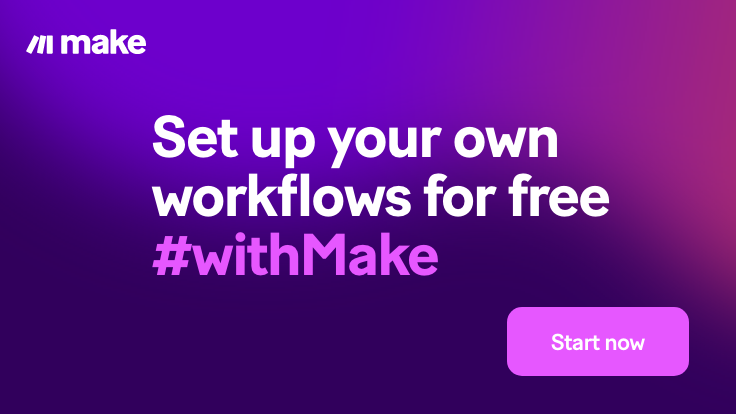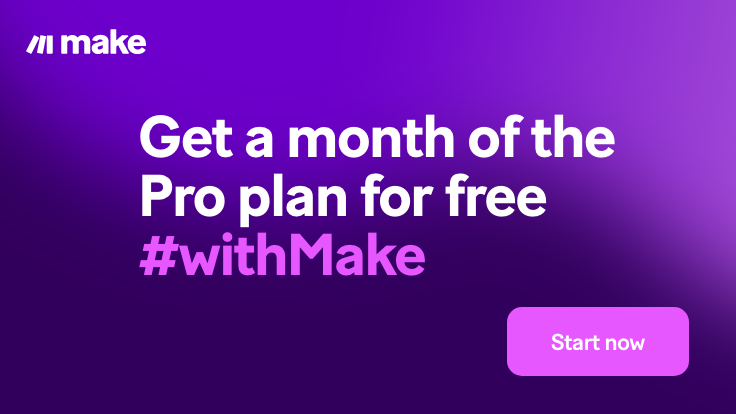AI is shaking up healthcare in ways that feel straight out of science fiction, but these changes are happening now.
From smarter diagnosis tools and personalized treatment to remote monitoring and automated medical records, today’s AI healthcare apps are transforming how doctors and patients connect and how care gets delivered.
These apps help doctors spot issues faster and give patients round-the-clock health support, all while reducing paperwork and cutting costs.
In this guide, you’ll discover the 17 AI healthcare apps that are leading the charge, reshaping patient care and making clinical workflows smoother and more reliable for everyone.
How AI is Enhancing Healthcare Today

Artificial intelligence is quietly working behind the scenes to make healthcare smarter, faster, and more reliable for everyone.
AI tools aren’t just hype, they’re a visible part of doctor’s offices, hospitals, and even in your pocket as apps. By sorting huge amounts of health data and learning from it, AI is helping doctors make better decisions, supporting early detection, and streamlining care for patients.
Let’s break down some of the most practical ways AI is making healthcare better right now.
Faster and More Accurate Diagnosis
AI-powered tools cut through the noise by analyzing scans, blood tests, and patient records much faster than people can manage on their own.
These tools can flag issues that a doctor might miss, like early tumors in X-rays or signs of diabetic eye disease in photos of the retina.
- Early detection helps with conditions like cancer and heart disease, where quick action means better results.
- AI-based platforms now assist radiologists by reviewing thousands of images in moments, making sure subtle problems don’t get overlooked.
The combination of AI and imaging technology means more people get the right diagnosis the first time, which leads to safer treatment plans.
Personalized Treatment and Medicine
AI isn’t just for spotting problems, it can also recommend custom treatment plans based on what works for people with similar medical histories.
By crunching numbers from previous cases, these systems can tell doctors which treatments might give the best outcome for an individual.
- AI models can predict drug reactions or side effects before a person tries a new prescription.
- Tailored cancer therapies and genetic medicine are now possible because of AI’s pattern-spotting ability.
Doctors can now move away from “one-size-fits-all” medicine and get closer to personalized care, where the treatment really fits the patient.
Smarter Remote Monitoring
Wearables and smart devices are transforming how care continues outside the clinic. AI algorithms constantly study your data, like heart rate, blood pressure, or glucose levels, and flag any worrying trends.
- Remote monitoring helps people manage chronic illnesses such as diabetes and heart failure.
- Some apps now alert users or even healthcare providers the moment something seems off.
This round-the-clock attention means fewer emergency visits and a safer, more comfortable life for patients at home.
Streamlined Administrative Work
Behind every patient visit is a mountain of paperwork and scheduling. AI cuts through this clutter, helping clinics focus on care instead of clerical work.
- AI chatbots help with basic questions, reducing time spent on calls.
- Automated scheduling, claims processing, and note-taking tools mean healthcare professionals have more time for what matters.
A more efficient system shortens wait times, cuts down on costly mistakes, and makes life less stressful for everyone involved. For an in-depth look at how AI is making a difference across industries, the National Libary of Medicine’s article on AI and healthcare offers strong examples from both hospital and home care settings.
AI may not be wearing a doctor’s coat, but there’s no denying its impact as a smart partner in nearly every step of the healthcare journey.
Criteria for Selecting the Best AI Healthcare Apps
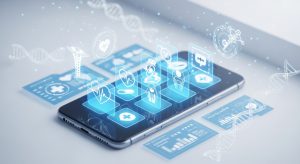
Choosing the best AI healthcare apps isn’t just about slick interfaces or the latest buzzwords. As healthcare gets more complex and patients demand reliable solutions, a few core factors stand out. Below, you’ll find the key criteria you should weigh before trusting an app with your health or clinical work.
Clinical Accuracy and Evidence
First and foremost, any AI healthcare app needs to prove it gets results. Apps should be built on solid clinical data and undergo ongoing validation to ensure accuracy. Look for platforms that share peer-reviewed studies or have backing from reputable medical sources.
When comparing options, you can check for:
- Validation through clinical trials or real-world evidence
- Transparent reporting on diagnostic accuracy or prediction rates
- Endorsements from hospitals or medical associations
Sometimes, the best way to gauge accuracy is to see what professionals are already using. For recent, credible insights, check out the AMA’s report on making AI tools work for patients and physicians, which offers practical examples of trusted, clinically-informed solutions.
Privacy and Data Security
Healthcare data is some of the most personal information out there. The top apps must prioritize strong privacy measures and comply with policies like HIPAA or GDPR.
Standards to look for include:
- End-to-end encryption of health records
- Clear privacy policies and user control over data sharing
- Regular security audits or third-party certifications
Choosing an app with solid security isn’t just smart, it’s essential for trust and patient safety.
Personalization and Usability
Everyone’s health story is unique, and the right AI app should reflect that. The most effective apps blend advanced algorithms with an easy-to-use design that fits into daily routines.
Key features to evaluate:
- Adaptive recommendations based on a user’s history, habits, or test results
- Simple, intuitive interfaces suitable for all types of users
- Seamless integration with wearables and existing health systems
If it doesn’t save time or meet the user where they are, even the most powerful tech won’t deliver real value.
Integration with Clinical Workflows
For doctors, nurses, and clinics, the best apps fit into existing routines, not the other way around. Look for platforms that support compatibility with electronic health record (EHR) systems and foster smooth communication between healthcare teams.
Important integration points:
- API availability for connecting with hospital software
- Shared dashboards for care teams
- Support for telehealth and remote patient management
Apps that work hand-in-hand with clinical workflows lead to safer care and less duplication of work.
Transparent Pricing and Support
No one likes surprises, especially when it comes to cost or technical help. Market leaders are now upfront about their pricing, offer trials, and provide reliable support.
When picking a solution, expect:
- Transparent, easy-to-find pricing plans
- Free trials or pilot periods for testing features
- Accessible help desks, tutorials, or community support
You can compare pricing and support offerings across platforms by checking guides like this comparison of leading AI healthcare applications.
User Reviews and Rankings
Real-world feedback counts. Honest reviews from both patients and healthcare professionals speak volumes about an app’s effectiveness, reliability, and daily usability.
Why check reviews?
- Insights into setup speed, technical issues, or standout features
- User experiences that surface hidden strengths or weaknesses
- Rankings that reflect ongoing updates and real-world performance
Weighing these factors together, you’ll find an AI healthcare app that’s not just trendy but truly trustworthy for the needs of and beyond.
17 Best AI Healthcare Apps Making a Difference
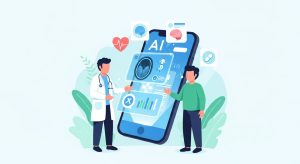
AI in healthcare is no longer just a promise for the future, it’s streamlining patient care, improving diagnosis, and personalizing treatment today.
The apps below are proving this by bringing real-time support, advanced data analysis, and easy access to care into the palm of your hand.
Each of these platforms stands out in its own way, whether it’s saving lives through early detection, supporting mental well-being, or automating time-consuming tasks for both patients and professionals.
1. Ada Health: Personalized Symptom Assessment and EHR Integration
Ada Health takes symptom checking to a whole new level. Its AI-powered platform uses your data and symptoms to provide tailored health assessments with high diagnostic accuracy.
Ada is known for integrating smoothly with electronic health records, which means doctors get a more complete picture without extra paperwork.
With strong validation in clinical settings, many patients and healthcare providers trust Ada as a first step for answers before heading to the clinic.
2. Babylon Health: Virtual Consultations and Smart Diagnosis
Babylon Health connects patients to doctors virtually, making remote consultations fast and simple. The app uses AI to triage your symptoms, pointing you to the right level of care or recommending a virtual visit.
Users often report high satisfaction, thanks to the quick service and clear advice.
3. Biofourmis: Real-Time Vital Monitoring and Fewer Readmissions
Biofourmis is making waves in remote patient monitoring by tracking vital signs in real time. With its AI-driven programs, it can spot issues before they turn into emergencies, which cuts down on costly hospital readmissions.
Patients with chronic conditions benefit from personalized alerts, while providers receive actionable insights that improve care plans, saving time and reducing risk.
4. Woebot: Proven AI for Mental Health
Woebot blends chat technology with evidence-based mental health support. Its friendly AI chatbot offers conversations and exercises rooted in cognitive behavioral therapy, proven to help manage stress, anxiety, and depression.
Woebot acts like a pocket-sized therapist available anytime, bringing support and coping tools right when you need them.
5. Tempus: AI in Precision Cancer Care
Tempus uses artificial intelligence to analyze vast amounts of clinical and genomic data for personalized cancer treatment.
By matching patient records with the latest oncology research, Tempus helps doctors choose the most effective therapies.
Its smart algorithms continue to set new standards for how data and precision medicine guide cancer care.
6. PathAI: Smarter Diagnostic Pathology
PathAI leverages advanced algorithms to improve the accuracy and efficiency of pathology diagnoses. Its systems help pathologists review slides, spot subtle disease markers, and validate challenging cases.
Early clinical studies show higher diagnostic accuracy, with fewer errors and faster turnaround, all critical for timely treatment decisions.
7. Freenome: Early Cancer Detection with Multiomics
Freenome is pushing forward early cancer detection using AI-driven multiomics analysis. By weaving together blood test data from different biological layers, like DNA and proteins, Freenome’s system catches early signs of cancer that conventional methods may miss. This approach supports quicker, less invasive screening options.
8. Butterfly Network: AI-Powered Portable Ultrasound
Butterfly Network brings powerful ultrasound imaging to your pocket. Its handheld, AI-enabled devices plug into a smartphone and deliver instant, clear scans. Doctors in primary care, emergency rooms, or even remote settings use Butterfly’s tools for fast, point-of-care diagnostics, speeding up decisions and improving outcomes.
9. Owkin: Collaborative AI in Drug Discovery
Owkin specializes in federated learning, a way to train AI models on data from multiple hospitals without centralizing patient records. Owkin’s platform supports drug discovery and predictive modeling by tapping into diverse, secure datasets. This approach speeds up breakthroughs while keeping patient privacy protected.
10. Aidoc: AI Imaging and Workflow Automation
Aidoc offers a suite of FDA-cleared solutions that scan medical images and flag urgent cases, like strokes or pulmonary embolisms. Hospitals use Aidoc to automate parts of their workflow, which means radiologists get early warnings and patient care moves faster. Its growing list of regulatory approvals shows Aidoc’s value in real-world, high-pressure environments.
11. Athelas: AI-Enabled Blood Analysis and Disease Tracking
Athelas provides rapid blood cell analysis using compact, AI-driven devices. With a few drops of blood, it helps manage conditions like infection or cancer by updating care teams and patients in real time. Athelas systems support ongoing chronic disease monitoring, reducing the need for lab visits and making life simpler for those with long-term conditions.
12. Teladoc: The AI-Driven Telemedicine Backbone
Teladoc is a major player in virtual care, powered by intelligent triage and patient matching. AI helps match symptoms to the right type of doctor and guides patients to timely consultations. As telemedicine grows, Teladoc’s technology is keeping care scalable and making digital checkups as effective as in-person visits.
13. Amwell: Automated Patient Support and Mental Health
Amwell brings AI together with telehealth to boost patient engagement and streamline appointment management. The app uses AI bots to answer questions and automate reminders, freeing up human staff for more complex care. Amwell also supports virtual mental health care, expanding easy access to behavioral health professionals.
14. PlushCare: Fast Symptom Checking and Expanded Access
PlushCare lets users check symptoms using an AI-powered tool, so they know when to schedule a virtual doctor visit. This quick triage improves access for people in rural areas or those juggling busy days. With experienced physicians ready online, PlushCare brings high-quality care right to your phone.
15. Noom: Weight Loss and Lasting Change with AI
Noom stands out with its AI-based coaching that guides people through weight loss and changing habits for good. The app analyzes user inputs and behaviors, delivering daily nudges and feedback so changes stick. Noom blends psychology, smart tracking, and personal coaching into a supportive experience.
16. Huiying Medical: Superior COVID-19 Imaging
Huiying Medical made global headlines for its AI-driven analysis of chest CT scans during the COVID-19 crisis. Its algorithms quickly and accurately spotted signs of infection on images, helping hospitals triage and treat patients faster than manual review alone. Huiying Medical’s work showcased the power of AI in responding to sudden public health threats.
17. Youper: Chatbot Therapy Designed for You
Youper offers AI-driven support and mental health management in a simple chat app. Its guided conversations and personalized exercises are based on proven therapy methods, helping users navigate mood swings, anxiety, and daily stress. Youper adapts advice to each person, putting a mental health ally in your pocket anytime you need it.
If you want to explore even more advanced examples or compare categories, check out these healthcare AI use cases with examples to see how these tools stack up in practice.
Emerging Trends and Challenges in AI Healthcare Apps
AI healthcare apps are growing fast, both in number and impact. As new tools unlock smarter care and more personalized medicine, the industry faces big questions and ongoing hurdles. Understanding the latest trends and current roadblocks helps patients, doctors, and developers make better choices as these apps keep changing medicine.
Widening Access and Advancing Personalization
One standout trend: AI apps are making healthcare more personal and accessible. Platforms now use big data to tailor recommendations for each person. Instead of static answers, users get dynamic health advice that adjusts to their needs and habits. This means patients in remote spots or with busy lives can get expert help on their terms.
AI-powered monitoring tools let people track chronic conditions from home, often sharing updates in real time with their care teams. For those with long-term illnesses, this constant connection can catch problems early and reduce emergency visits. It’s like having a digital safety net, making care proactive instead of reactive.
Tackling Bias and Data Privacy
AI models learn from large amounts of data, but if that data carries bias, from unbalanced samples or flawed records, then the advice or diagnosis given can be misleading. Biased outcomes are especially risky in healthcare, where errors have bigger consequences. Protecting against this means regular audits, continuous model updates, and transparent review.
With health data as sensitive as it gets, privacy is front and center. Strict rules like HIPAA in the US or GDPR in Europe set the standards, but not every app meets them equally. Users should check for strong encryption and control over who sees their information. As the volume of personal health data grows, keeping it safe remains a top concern.
For a thorough look at ethical issues such as privacy and bias, see this review on ethical issues and protection in AI healthcare apps.
The Challenge of Black-Box Decisions
AI can process complex input and deliver fast answers, but sometimes the logic behind a result is hidden even from its creators. These “black-box” systems erode trust, especially when a critical health call is based on hidden calculations. Many clinicians now push for more transparent, explainable AI systems that can show how they arrived at their conclusions.
Developers are working to make their models less opaque. Some apps now offer detailed reasoning or supporting data behind their outputs, so patients and providers can better understand each recommendation. Black-box reasoning and automation bias continue to be discussed as more decisions move into digital hands.
Integration with Existing Healthcare Systems
For AI to be truly effective, it needs to fit within how clinics and hospitals already work. App makers are investing in smoother integration with electronic health record systems, allowing data to flow safely and support better teamwork among healthcare professionals. This isn’t always easy, given the variety of tech standards and privacy requirements across medical settings.
When apps connect smoothly with established systems, clinicians can avoid confusing duplication and provide faster care that matches each patient’s history. Seamless integration is both a technical and a strategic challenge but it’s key to making AI mainstream in medicine.
Adapting to Regulation and Ongoing Updates
Regulations are catching up to new AI technology. As a result, app makers must pass more frequent audits, share proof of effectiveness, and stay ahead of changing standards. The benefit for users is more reliable products; the downside for companies is a higher bar for entry and more frequent updates.
Apps that fail to evolve can fall behind fast. Ongoing development and flexible design help products stay safe, accurate, and trustworthy as best practices, and medical knowledge change over time.
The Human Touch in Digital Healthcare
AI tools are improving, but patients still value empathy and context from real healthcare professionals. Blending smart tech with real people’s expertise is the goal. Apps that keep doctors, nurses, or counselors in the loop often see better trust and long-term use.
According to recent case studies, empowering users while keeping support systems in place prevents the loss of autonomy or isolation some might feel when managing health through a screen. Review real-world implications at this NIH-backed overview of opportunities and risks.
The best apps don’t aim to replace the human touch, but support it. As trends progress, the challenge is to find the right mix of smart automation and hands-on care, making technology a partner, not a substitute, in every patient’s health journey.
Future Outlook: The Impact of AI on Medicine
The future of medicine will be shaped by artificial intelligence in ways that are both exciting and realistic. With AI growing stronger year by year, healthcare is on the path to becoming safer, more personal, and more efficient. By looking ahead, we can see the ripple effects that smarter algorithms and better automation will have on everything from patient care to global health outcomes.
AI-Powered Preventive Care and Early Detection
One of the most promising shifts will be a stronger focus on preventive care. AI won’t just help treat illnesses; it will predict and catch them earlier than ever before. Smart wearables and mobile apps will watch for changes in vital signs and flag possible issues before symptoms show up. Imagine daily checkups happening quietly in the background, with AI sending gentle reminders or alerts to book a visit before small problems become major setbacks.
AI-driven preventive care could mean:
- Fewer emergency visits through early warnings.
- Lower costs for patients and clinics alike.
- More people living longer, healthier lives thanks to proactive support.
Smarter Drug Development and Clinical Trials
AI’s ability to quickly analyze large datasets will unlock faster drug development. Pharmaceutical companies can run virtual tests on new compounds, reducing the need for lengthy and expensive lab work. AI will identify patterns in test results, predict side effects, and match drugs to the right patient types.
Benefits already surfacing include:
- Shorter timelines for new treatments to reach the market.
- Better outcomes in personalized medicine.
- Higher safety rates in trials with fewer unknown risks.
For more insights into how AI is transforming drug discovery and medical research, this Wired article Where Are All the AI Drugs? offers an in-depth exploration of recent breakthroughs.
Global Access and Bridging the Healthcare Gap
AI-driven tools are expanding access to care, even in the most remote places. Virtual consultations, automated triage, and language-translation apps make expert help available nearly anywhere with an Internet connection. By reducing the need for in-person visits, AI gives underserved communities access that simply wasn’t possible before.
Key advancements to watch:
- Multilingual AI chatbots that guide patients through symptom checks.
- Telemedicine supported by automated translation for global reach.
- Portable diagnostic devices that work without full hospitals or labs.
These advances help level the healthcare playing field, supporting equity both within and between countries.
Real-Time Data Sharing and Decision Support
Smart algorithms are set to make care teams even stronger. In the near future, doctors will rely on AI for real-time decision support from flagging drug interactions to monitoring patient recovery in the ICU. Data from different providers will combine instantly, giving a fuller view of each patient.
Expect improvements like:
- Fewer medical errors due to AI alerts.
- Faster diagnosis and clear treatment plans, even in emergencies.
- More confidence for doctors and nurses as software double-checks every critical step.
Ongoing Challenges: Trust, Regulation, and Human Oversight
As AI becomes more common in medicine, some challenges will stick around. Trusting a machine with health decisions isn’t easy for everyone. Strict oversight from regulators will help ensure safety, fairness, and responsible AI use. Keeping human experts involved will prevent mistakes and bring empathy to digital healthcare.
- New rules will shape how data is collected and used in AI tools.
- Transparent, explainable AI will grow more important for building trust.
- Healthcare teams will still be essential, using AI as a tool and not a replacement.
The path ahead points to a future where AI doesn’t replace the human touch but amplifies it, giving doctors and patients more time and better tools to work and heal together. As these AI healthcare trends continue, staying updated on both opportunities and ethical challenges is key.
For a broader look at how AI is reshaping industries, this Gartner article on generative AI use cases across industries offers practical, real-world examples from healthcare to automotive to banking.
Conclusion
Picking the right AI healthcare app is a personal decision, and the best choice comes down to your own needs and goals. The right tool should improve your health journey, help your clinicians do their jobs more easily, and give you peace of mind about your information and care.
Take time to check clinical evidence, data privacy practices, and real reviews before deciding. If you’re curious about more options, or want to see how AI can help in other areas beyond healthcare, explore guides like the Top AI Search Engines to see how specialized tools are supporting productivity across fields.
Thank you for reading. If you’ve tried any of these apps or found something even better, share your thoughts below. For a deeper look at new artificial intelligence solutions, visit elloAI.com to stay ahead of what’s possible.

